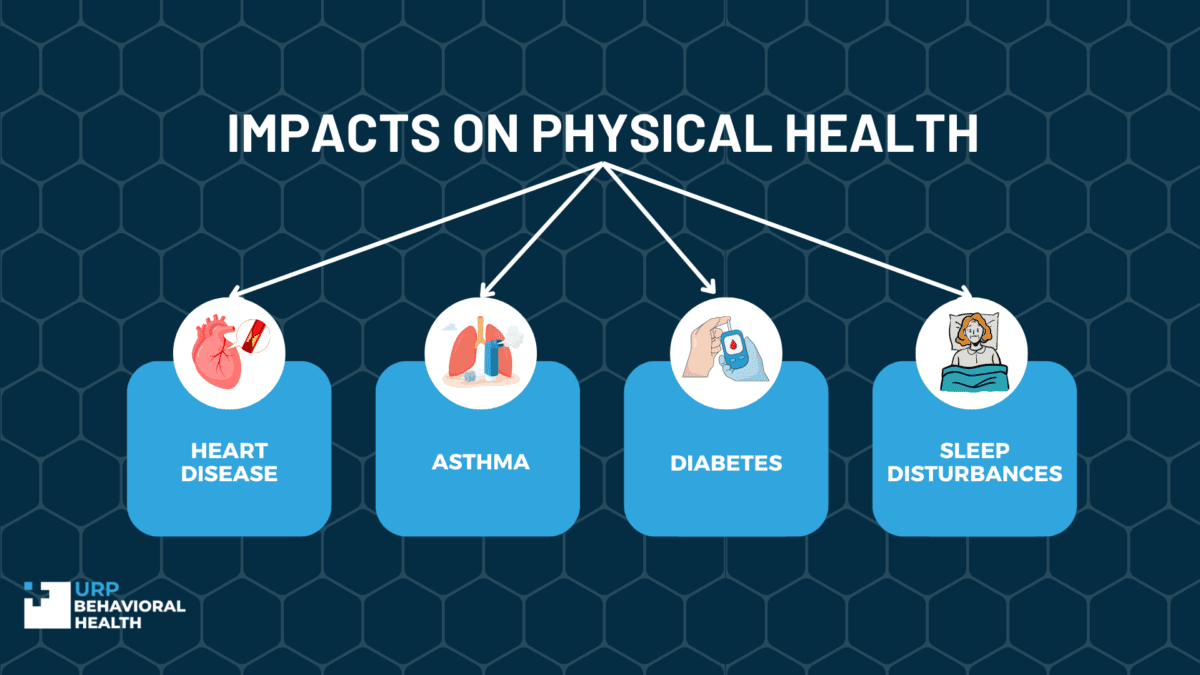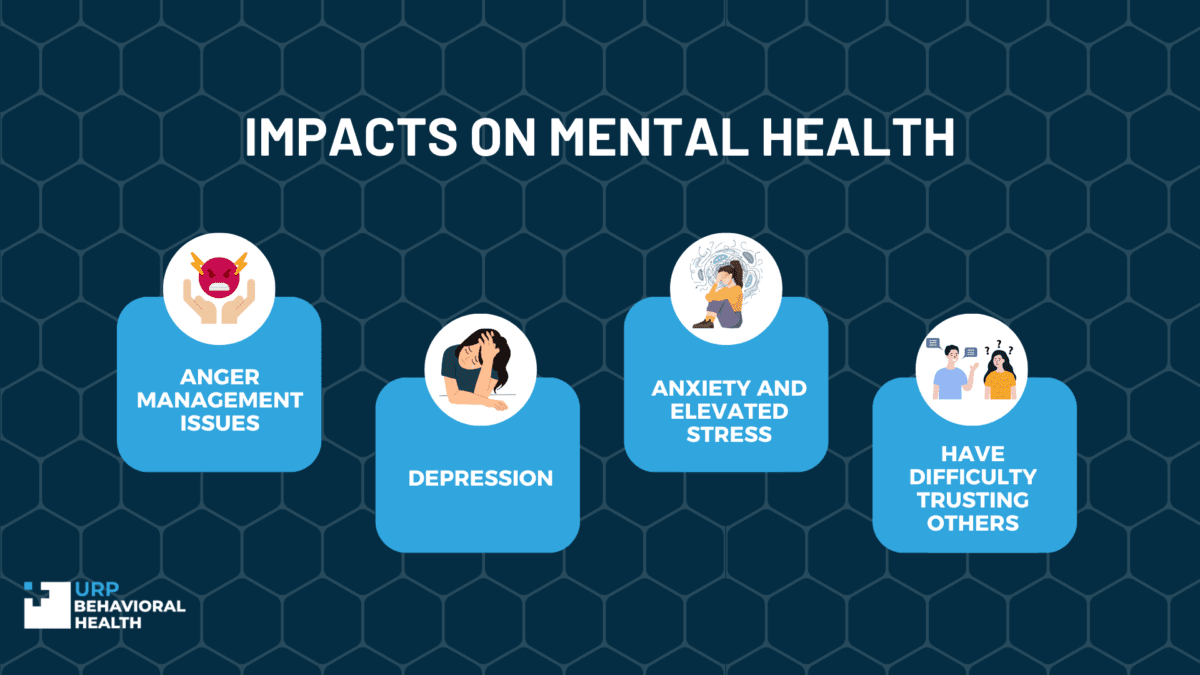Childhood Trauma: How It Affects Your Mental and Physical Health

In the US, about 34.8 million children go through adverse childhood experiences that leave a lasting impact on their mental and physical well-being. About 26 percent of children in the US experience or witness a traumatic event before the age of four.
Many of these children can end up developing issues such as PTSD and other psychological health concerns. When compared to interpersonal trauma experienced during adulthood, childhood trauma is significantly associated with conditions like PTSD, agoraphobia, and panic disorder. Because of its effects, it’s important to look at what constitutes childhood trauma, its link with PTSD, and its impacts on both physical and mental health.

What is Childhood Trauma?
As per the National Institute of Mental Health, it is when a child experiences an event that’s emotionally painful or distressful and leads to lasting effects. This traumatic event can be dangerous, violent, or frightening circumstances that threaten a child’s life or bodily integrity.
Similarly, witnessing an event that threatens the safety of a caregiver can also be traumatic. This affects young children because their sense of security depends on how safe they think their attachment figures are.
Does Childhood Trauma Cause PTSD?
Traumatic experiences can cause strong physical reactions and emotions that persist even after the event. These events can cause different reactions, like traumatic shock or PTSD, although it’s important to remember that not all trauma exposure results in a PTSD diagnosis. In children, PTSD can look like:
- Complaints about sleep problems and nightmares
- Intense sadness or ongoing fear
- Anger outbursts and irritability
- Feeling upset when they remember the event
The severity and duration of a traumatic event, as well as the presence of protective factors, determine whether a child develops PTSD. Common protective factors include having safe and supportive surroundings.
Nevertheless, anyone who has experienced a traumatic event can develop PTSD. Such experiences can be a single event or a series of events, the effects of which can be observed well into adulthood. Other studies point to a link between childhood trauma, PTSD, and substance abuse. Researchers explain that people with early-life trauma have a higher likelihood of using alcohol to cope with trauma-related symptoms.

Impacts on Physical Health
Heart Disease
Research by the American Heart Association shows that childhood trauma, especially physical abuse, can contribute to a higher risk of heart failure in the long term. The results of the research showed that experiencing any one of the five types of childhood maltreatment was associated with a 14 percent increase. It also indicated that participants who experienced three to five types of maltreatment had a 43 percent increased risk of heart failure.
Asthma
There’s evidence that points to the link between childhood adversity and a higher susceptibility to chronic diseases such as asthma. According to one meta-analysis, researchers theorize that childhood trauma caused epigenetic changes in asthma-related genes. The analysis showed that numerous genes and pathways that contribute to asthma development or response to asthma treatment are epigenetically affected by childhood adversity.
Diabetes
In a report that was published in the journal Diabetologia, researchers found that traumatic life events can increase the risk of young children developing type 1 diabetes. These events can include witnessing the death of a loved one or a serious accident. Researchers expect that children who develop type 1 diabetes because of exposure to trauma may have a genetic predisposition for the disease. However, these genetic triggers aren’t activated unless they experience some stress or trauma.
Sleep Disturbances
Childhood trauma can affect the severity of insomnia and sleep disturbances experienced during adulthood. In a study involving adult patients with insomnia, those who had a higher number of adverse childhood experiences woke up more often during the night compared to those who had fewer or no such experiences.

Impacts on Mental Health
Anger Management Issues
The shock and trauma of events like childhood abuse can impact how well you learn to control your emotions. This can lead to problems such as outbursts of intense emotions, such as anger and rage. Another analysis of the link between childhood trauma and anger showed that all types of trauma, except sexual abuse, led to increased anger. Researchers theorize that children may learn anger as a survival mechanism.
Depression
There’s a consensus among mental health experts that childhood trauma results in a higher risk of depression. In a study involving 349 chronically depressed clients, 75.6 percent reported clinically significant childhood trauma. Meanwhile, 37 percent of the patients said that they had experienced multiple traumatic events. Researchers also found that experiencing multiple traumatic events led to more severe symptoms.
Anxiety and Elevated Stress
In a study involving 1800 people, researchers found that participants who reported childhood trauma, such as neglect or abuse, also reported anxiety and long-term pain. Mental health experts agree that childhood trauma is a predisposing factor in developing anxiety disorders during adulthood. There’s also evidence that childhood trauma can contribute to changes in the nervous system, such as an overactive amygdala. These changes can lead to hypervigilance of their physical sensations.
Have Difficulty Trusting Others
When you go through adverse childhood experiences, trusting other people becomes much more difficult and complex, leading to isolation and an inability to develop healthy relationships. In a study that assessed children between the ages of 8 and 12, those who had experienced sexual abuse reported lower interpersonal trust.
Healing From Childhood Trauma
Despite the impacts of childhood trauma on your well-being, it’s possible to acknowledge it and start healing. Seeking support through close friends and support groups and consulting a professional are good places to start. Seeing a mental health practitioner can help you build new coping strategies and restructure dysfunctional thoughts. And with therapies like EMDR, you can also reprocess the event so that it’s no longer traumatizing.
Let us guide you towards healing
We know that seeking treatment can be overwhelming, but our staff is here to make the process as smooth as possible. We’re available 24/7 to address any questions or concerns you may have.

